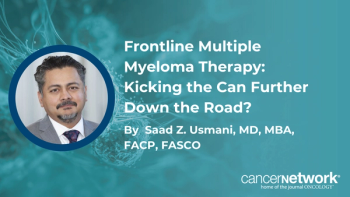
Fixed-Duration Glofitamab Regimen Elicits Early, Durable Responses in Heavily Pretreated Patients with Relapsed/Refractory Mantle Cell Lymphoma
The use of a fixed-duration regimen of glofitamab several days after pretreatment with obinutuzumab was associated with high complete responses among a group of heavily pretreated patients with relapsed or refractory mantle cell lymphoma.
Treatment with obinutuzumab (Gazyva) 7 days prior to the administration of a fixed dosing regimen of glofitamab induced durable treatment responses in a group of heavily pretreated patients with relapsed or refractory mantle cell lymphoma (MCL), according to data presented at the 2022 American Society of Hematology (ASH) Annual Meeting.1
Moreover, the findings demonstrated that many patients achieved a complete response quickly during the 12-cycle glofitamab regimen.
The readout of these results follows the data published last year showing that the use of a step-up-dosing regimen of glofitamab after pretreatment with obinutuzumab elicited high response rates in patients with MCL whose disease had stopped responding to Bruton’s tyrosine kinase inhibitors (BTKi).2
“We see high overall response rates, irrespective of the obinutuzumab dose given as far as pretreatment,” Tycel J. Phillips, MD, an assistant professor within the Division of Hematology Oncology at University of Michigan Rogel Cancer Center in Ann Arbor, said during the presentation.
The study population comprised 37 patients (median age, 72.0 years [range: 41–84]; 73.0% male) who received pretreatment with obinutuzumab at either a dosage of 1000 mg (n = 16) or 2000 mg (n = 21).
Patients enrolled in the study had received a median of 3 prior lines of therapy (range: 1–5). More than half of the study population (64.9%) had prior treatment with a BTKi, and 7 patients had previously received lenalidomide (Revlimid).
Most of the patients (62.2%) did not derive a response from their first treatment and/or their most recent treatment (73.0%). The median time since receipt of last treatment was 1.9 months (range: 0.1–107.5).
At a median follow-up of 8.0 months, the findings demonstrated that median time to first treatment response was 51 days (range: 29-234). Additionally, the overall response rate among the patient population at first assessment was 73%, with a complete response rate of 48.6%.
The responses, Phillips noted, were long-lasting in the patient population.
For instance, the median duration of complete response was 10.0 months (95% CI, 4.9–NE) and 20 of the 27 patients who achieved a complete response remained in remission at data cut-off.
“Of note, no progression of disease was reported after the end of treatment in patients [who achieved] response at [the] end [their] of treatment,” he said.
Most of the adverse events (AEs) of any grade (94.6%) were related to the use of glofitamab. Serious AEs were reported in 78.4% of the overall patient population, with 62.2% being attributed to glofitamab. There were 10 patient deaths on the trial; however none were attributed to either obinutuzumab or glofitamab, according to Phillips.
Three patient deaths were attributed to COVID-19 infection, 1 was cardiac-related and the remaining deaths were due to disease progression.
The most common AEs of any grade among the overall patient population included, but were not limited to, cytokine release syndrome (75.7%), neutropenia (45.9%), and anemia (32.4%).
Phillips noted that most of the cytokine release syndrome events were grade 1 or grade 2 (29.7% for each).
As for the other AEs of interest, 24 patients developed an any-grade infection or infestation. Neutropenia was also a commonly occurring AE, with 45.9% of patients reporting an occurrence of any grade.
“Glofitamab monotherapy with fixed treatment duration of 12 cycles, induced high CR rates in heavily pretreated patients with mantle cell lymphoma,” Phillips noted. “The CR rates were early and were durable; glofitamab was well tolerated and there was no treatment discontinuation due to adverse events. [CRS] events were manageable and predominantly low.”
Phillips concluded by noting that there are plans for a phase 3 study assessing glofitamab monotherapy in patients with relapsed/refractory mantle cell lymphoma. He noted that the trial will be a randomized study investigating glofitamab vs a standard-of-care choice treatment arm, but said he was unable to disclose the third treatment arm at this time.
Reference
- Phillips TJ, Dickinson M, Morschhauser F, et al. Glofitamab monotherapy induces high complete response rates in patients with heavily pretreated relapsed or refractory mantle cell lymphoma. Presented at: 64th American Society of Hematology Annual Meeting and Exposition; December 10-13, 2022; New Orleans, Louisiana. Abstract 74.
- Phillips TJ, Dickinson M, Morschhauser F, et al. Glofitamab step-up dosing induces high response rates in patients (pts) with relapsed or refractory (R/R) mantle cell lymphoma (MCL), most of whom had failed prior Bruton's tyrosine kinase inhibitor (BTKi) therapy. Blood. 2021. doi: 10.1182/blood-2021-148949.
Newsletter
Stay up to date on recent advances in the multidisciplinary approach to cancer.






































